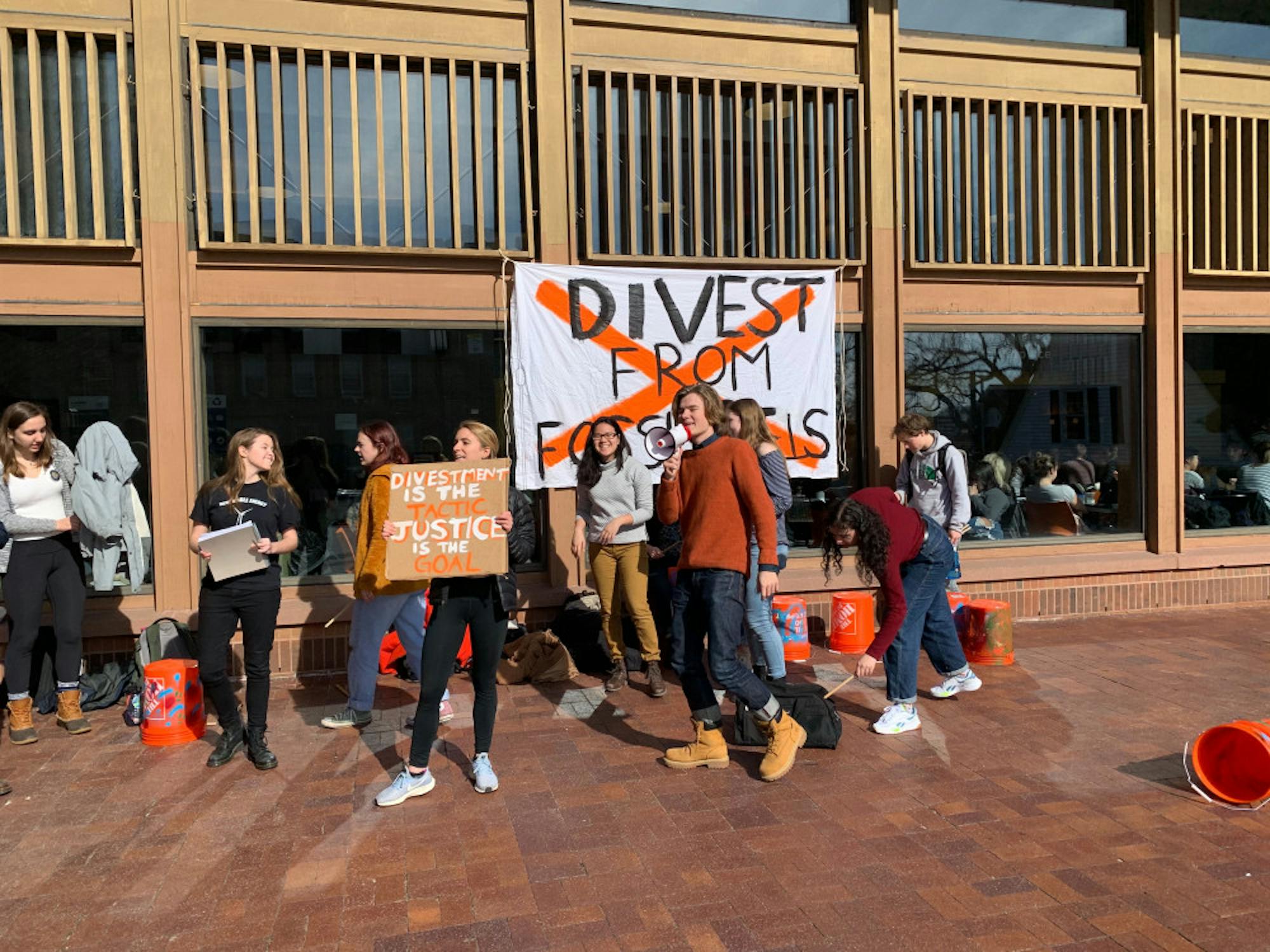Tuftsannounced on Feb. 10 its decision to ban direct investment in "120 coal and tar sands companies with the largest reserves" in a statement emailed to the community.According to the same email, Tufts will also allocate between $10 million and $25 million toward “positive impact funds” in climate change over the next five years. While Tufts does not currently have any direct holdings in coal and tar sands companies through internally managed accounts, this decision prevents Tufts from any future holdings. According to the statement, the steps that Tufts is taking are based on the recommendations of the Responsible Investment Advisory Group in its December 2020report.
Approved on Nov. 2, 2019,the RIAG was formed with the goal of assisting the university in examining the social impact of its financial decisions and investments. The RIAG is a non-standing group consisting of students, faculty, administrative staff and trustees, which convenes when a proposal is approved by a sponsor, which then must be approved by the Tufts administration. The RIAG's financial recommendations to the Tufts Investment Committee are nonbinding. The current RIAG addressing Tufts’ investments in fossil fuel companies wasestablished following an initial proposaldrafted by members of Tufts Climate Action in December 2019.
The December 2020 RIAG report lists six concrete recommendations regarding divestment from fossil fuel companies. The recommendations are largely based on an in-depth analysis of Tufts’ financeswithin its endowment; research on divestment policies and strategies of other colleges and universities; and a review of Tufts’ history with fossil fuel divestment.
Pressure for Tufts to divest from fossil fuel companies is notjust a recent occurrence. In February 2013, a group of Tufts students submitted a proposal demanding that the university divest. This prompted University President Anthony Monaco to establish theTufts Divestment Working Group, a committee of students, faculty and trustees designed to advise the administration regarding decisions surrounding divestment.
In areport delivered to President Monaco on Jan. 9, 2014, the Tufts Divestment Working Group recommended that Tufts refrain from divesting due to the potential negative impact on its endowment. In particular, the report suggested that divestment would lead — by conservative estimates — to a loss of $75 million in the ensuing five years. Instead, the group recommended the establishment of a Sustainability Fund, which today is known as the Green Fund.
The 2014 investment policy was kept in place for several years thereafter. In 2019,pressure from a unanimous TCU Senate resolution calling for a carbon-neutral endowment, along with weekly divestment demonstrations outside of Ballou Hall, finally led the Board of Trustees to approve the creation of a RIAG process.
In astatement posted online responding to the announcement, TCA acknowledged that the decision to partially divest is the result of years of hard work by student activists.
“TCA is excited about this meaningful step toward climate justice at Tufts,” the statement says. “This decision is the culmination of many years of hard work and advocacy, and we are grateful for the dedicated student and faculty activists who made this happen. We hope that the decision signals a willingness of administration to listen to community demands and make Tufts a more democratic institution.”
However, in the same statement, TCA expressed dissatisfaction that Tufts is not fully divesting due to continued indirect investment in coal and tar sands companies and that the new policy does not specifically target oil and natural gas companies.
“[W]e are not satisfied until full divestment, and TCA will continue working toward this goal,” the statement says.
According to Patrick Collins, executive director of media relations at Tufts, the university will continue to have exposure to fossil fuel investments due to its involvement in various commingled funds and separately managed accounts. These are funds in which Tufts invests along with other co-investors.
According to the RIAG report, as of June 30, 2020, within the total return pool — Tufts’ largest portfolio — $10.3 million (0.5% of the portfolio) was invested in the now-banned coal and tar sands companies, roughly $9.6 million of which was through commingled funds and the rest through separately managed accounts.
Commingled funds are critical to the university’s endowment. The RIAG report states that the total return pool held $2 billion in assets at the end of fiscal year 2020, 87% of which was through commingled funds, 11% through separately managed accounts and 2% through internally managed accounts.
“Our endowment, like those at many other universities, uses commingled or pooled funds,” Craig Smith, interim co-chief investment officer, wrote in an email to the Daily. “Investments in commingled funds offer Tufts the benefits of scale, access to leading investment managers and broad portfolio diversification.”
Commingled funds and separately managed accounts are managed by third parties; thus, Tufts is unable to dictate where these funds end up.
“One characteristic of this investment structure is that investors cannot dictate the guidelines of the commingled fund; they can only choose whether or not to invest under guidelines specified by the fund manager,” Smith said. “To divest from one particular industry would require divestment from the entire fund, with potentially significant implications for returns and costs.”
Tufts’endowment allows it to fulfill its mission, including providing the funds for student financial aid and scholarships. As commingled funds make up the vast majority of Tufts’ endowment, divestment from entire commingled funds would significantly impact Tufts’ endowment and what the university is able to provide. Considerations concerning the negative impact on Tufts’ endowment create a significant barrier to the university’s ability to completely reduce its exposure to fossil fuels.
While Tufts is not able to dictate underlying investments in commingled funds and separately managed accounts, it has committed to encouraging third party investment managers to include environmental, social and corporate governance concerns in their decision making. Smith is optimistic about Tufts’ ability to accomplish this.
“We are encouraged by trends among the investment managers with which we work. While they are taking positive steps, we are committed to advocating for them to accelerate their adoption and incorporation of ESG measures as they move forward,” he said.
However, in addition to Tufts’ continued indirect exposure to coal and tar sands companies, TCA also expressed disappointment that Tufts’ new initiative does not target oil and natural gas companies.
“Full divestment is important because oil and [natural] gas companies are putting out fossil fuels … that are destroying the environment just as much [as coal and tar sands],” Temple Miller-Hodgkin, a TCA member and student member in the RIAG, said.
Miller-Hodgkin, a junior, acknowledged that coal is the most harmful fossil fuel and if he had to choose, he would rather Tufts just divest from coal and tar sands than just divest from natural gas. But he doesn’t believe that should mean oil and gas companies should go unpunished.
“I definitely think that the whole fossil fuel industry is … at fault for a lot of these atrocities and a lot of the companies that are involved in oil and natural gas have been implicated in some of the worst pipeline spills,” he said. “It's not just coal and tar sands.”
In order to progress the fight for climate justice, Miller-Hodgkin believes that all perpetrators must be held accountable.
“If there's a wrong being perpetrated, you shouldn't just compromise … that's not how we envision justice. It has to be [that] all of the bad actors have to participate in the positive change that we want to see in the world, not just the worst.”
While Miller-Hodgkin applauds the university for divesting from future coal and tar sands companies, he believes that the university’s actions were motivated more as a result of market forces than anything else and that Tufts waited until coal became no longer profitable to finally divest.
“We already did not have stock in coal and tar sands, which makes sense because coal, especially, is kind of on the natural fade out. Coal is becoming less and less profitable as an industry and in general, fossil fuel companies in the sequence of how bad they are from the environment are starting to fade out anyway,” he said.
Miller-Hodgkin fears that Tufts will follow a similar approach in terms of divesting from oil and gas companies.
“What I can definitely see happening is the administration waiting until they naturally end up not invested in any oil and gas companies because it's not profitable. And then saying, ‘Oh well, now we can divest because we don't have any money in [the industries] anyway.’ I definitely think that we should [divest from oil and gas] while we still have some skin in the game,” he said.
Sophomore Julia Silberman, another TCA member, agreed.
“To be on the forefront of fossil fuel divestment, [Tufts] would have had to [divest] years ago because the movement really started [in] the 2010s — I believe [for] Tufts, around 2012. So, they are way behind there. They're just following the market at this point,” Silberman said.
While the university did not explicitly include oil and natural gas companies in its new initiative, many companies on the restricted list have natural gas reserves.
“While the list of prohibited companies will not specifically target natural gas companies, they will include companies with natural gas reserves/operations,” Collins wrote in an email to the Daily. “For example, the Tar Sands 20 list includes major oil companies, which will also have natural gas reserves/operations.”
When asked why the university isn’t specifically targeting oil and natural gas companies, Collins responded that the university is simply following the recommendations provided by the RIAG. Both Silberman and Miller-Hodgkin expressed concern that the university’s dependence on the RIAG report is a means of using the report as an excuse not to do more for the environment.
“A lot of the [university response was] ‘because the RIAG said so,’ and it's true they were taking the RIAG recommendations, but it's kind of disappointing that they were using that as a limitation rather than a jumping off point,” Silberman said.
Silberman cites the two-to-five-year reevaluation policy as another example. As part of the new initiative, the university has also committed to revisiting the decision and evaluating its progress in two to five years.
“We think the plan to revisit these decisions in 2 to 5 years is prudent in light of the rapid pace of change in the fields of environmental sustainability, energy production/consumption, and investing,” Collins said. “The RIAG recommended that time frame, which provides the university with time to review the impact of the policy changes and then consider any potential needed changes.”
But Silberman believes — given the imminent dangers of climate change — two to five years is too long to wait to revisit this initiative and the university should have shortened this time period.
“The climate crisis is imminent — there are already millions of climate refugees. We really don't have time to wait," she said.
As a member of the RIAG, Miller-Hodgkin voiced additional concerns about the decision-making process within the group.
“One of the considerations we had [in the RIAG] was that whatever we came up with had to be passed by the Board of Trustees, so we had to come up with something that we assumed would be conservative enough that the Board of Trustees would pass,” Miller-Hodgkin said.
Miller-Hodgkin believes this affected the way the RIAG approached its decision making.
“The RIAG had to think … ‘Will the trustees pass this? Is this something that the trustees will even consider?’ And so we already lost a lot of the steam by thinking of it that way,” he said.
Though Miller-Hodgkin is proud of the work the RIAG accomplished, and he is ultimately content with the student representation in the group, he would have liked the RIAG to have gone a lot further. A major limitation in divestment, according to Miller-Hodgkin, is that the system of college investing is inherently flawed. He believes that the entire system needs to be transformed.
“Tufts was thinking about how much it could do without fundamentally changing the way that the system works. And I think that they could have done more to actually change the system that underlies how Tufts invests and how [it] participate[s] in shaping the future of what college investment looks like,” he said. “I think that's what a lot of the divestment movement is about.”
Miller-Hodgkin likens the current structure of college investing to a game of Jenga, where Tufts has set itself up as a tall Jenga tower and is unable to pull out any investment pieces. But he believes solutions exist once the structure is rearranged, citing studies that have shown no loss of returns despite full divestment from fossil fuel companies. Specific studies are detailed in TCA’s 2019 proposal to establish a RIAG.
Silberman echoed this sentiment, citing that precedent already exists.
“If other universities and countries and states can do it, Tufts University can figure it out," Silberman said. She cited New York City's plan to divest its pension fund, along with the University of California'sfull divestment from fossil fuels. “There is precedent … They could follow the precedent, they could make their own, but they didn't really do either.”
According to the RIAG report, of the four-year institutions in the United States that have a plan to divest from fossil fuels in some form, only one institution with a larger endowment than Tufts — the University of California — has pledged to divest fully.
While Collins maintained that Tufts’ current level of divestment is appropriate, he emphasized the significance of the initiative as a whole.
“The steps taken by the university as part of this initiative — including prohibiting direct investments in coal and tar sands companies, investment up to $25 million in positive impact funds, and calling on external investment managers to incorporate environmental concerns into their decision-making — demonstrate its deep commitment to the cause of sustainability and the university’s continued leadership in higher education,” Collins said. “We’re proud of the steps we have taken and believe they will make a significant contribution to addressing the crisis of climate change.”
An aspect of Tufts’ initiative that Silberman is particularly excited about is the money that Tufts is allocating toward positive impact funds.
“We really like this idea of reinvestment,” Silberman said. “It's not just taking your money out of something; it's putting that money back into ethical funds.”
While optimistic, Silberman is hesitant to make a judgement.
“But we'd also like to know where specifically this money is going,” she said “[Are] these positive impact funds? [Or] are they more like [commingled] funds where it's going to be more [confidential]? Or is it going to be like direct investments into renewables, for example. So, I think … it's hard to make a judgment on whether or not we're happy with it until we know more information.”
Indeed, the university has made increased transparency a primary focus. Detailed in their statement is a plan to create a dashboard that will communicate Tufts’ progress on the initiative’s action items.
Moving forward, Miller-Hodgkin hopes to hold the university accountable regarding its pledge of transparency.
“We want to make sure that we're involved in the implementation process,” Miller-Hodgkin said. “[There’s] a lot of wiggle room on some of the [administration’s responses so] we want to make sure that there's a bit more transparency than there currently is going on.”
Despite the disappointment from Tufts’ decision, TCA will continue to push forward. For now, according to Silberman, TCA will not only continue to organize demonstrations, but also continue to work together with the university as they continue to pursue full divestment.
“We're trying to take a sort of halfway route between continuing to have a good relationship with the administration … but we're also trying to do demonstrations like normal TCA … actions,” she said. “Ultimately, divestment will be, in my opinion, a result of collaboration, because they're not going to do it on their own.”






